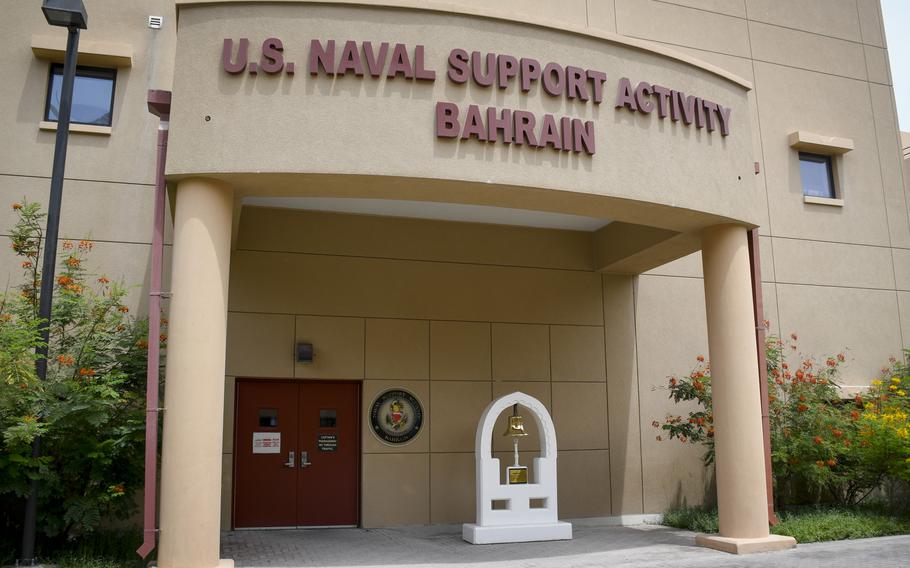
Naval Support Activity Bahrain in Manama, Bahrain, was put on heightened alert Sunday in the wake of U.S. strikes on Iran nuclear sites. (Stars and Stripes)
Updated June 23, 2025, 6:15 p.m. Manama local time
MANAMA, Bahrain — The Navy installation that is home to U.S. Naval Forces Central Command was on heightened alert Sunday, as a representative of Iran’s supreme leader called for a retaliatory attack on the American fleet there.
Naval Support Activity Bahrain remained under lockdown Sunday, with access limited to mission-critical personnel in the wake of U.S. strikes earlier in the weekend that President Donald Trump said had “obliterated” three of Tehran’s nuclear facilities.
All NSA Bahrain personnel not deemed mission-critical were instructed to limit their movements to essential activities, such as commuting for approved work duties or leaving home for necessities like medical appointments or shopping for grocery staples.
Core services, including the island’s only Navy Federal Credit Union branch and all medical facilities, have been shut down. Telemedicine appointments are available and personnel were notified Sunday of a behavioral health readiness clinic with limited hours open to walk-in access off-base.
The post office, which has been closed since June 14, briefly attempted to resume operations, but mail delivery was suspended again early Sunday.
The precautions come as Hossein Shariatmadari, a close aide of Ayatollah Ali Khamenei, said it’s Iran’s turn “to act without delay.”
“As a first step, we must launch a missile strike on the US naval fleet in Bahrain and simultaneously close the Strait of Hormuz to American, British, German, and French ships,” Shariatmadari told the pro-government Kayhan newspaper.
The closure of the on-base credit union has made it difficult for service members to pay rent in Bahrain, where payments typically require in-person currency conversion and cashier’s checks in dinars.
Navy Federal is waiving all international wire fees going back to June 10 in order to help members pay their rent, the credit union said Monday. A 24-hour customer service center is available at 1-888-842-6328, as is a mobile app.
Credit card payments also can be made for the rent portion only, but that comes with a surcharge of up to 5% per transaction.
With no clear reopening timelines and little guidance, some sailors said they are stressed and face the added pressure of being just as much in the dark as their landlords.
That’s on top of being largely confined to their apartments with nowhere to go and few services to rely on.
“It feels like COVID all over again, but with bombs,” Chief Petty Officer Daniel Hinton said.
In a statement Monday, Capt. Zachariah Aperauch, commander of the Navy’s installation at Bahrain, commended personnel for their “incredible work for the base and our military community through the combination of adaptability and vigilance.”
In the strikes early Sunday local time in Iran, the U.S. used B-2 stealth bombers to drop 30,000-pound “bunker buster” to penetrate the highly fortified nuclear enrichment sites in Fordo, Natanz and Isfahan.
Speaking from the White House on Saturday evening, Trump warned Tehran against counterstrikes.
“Iran, the bully of the Middle East, must now make peace,” he said. “If they do not, future attacks will be far greater and a lot easier.”
Iran launched a barrage of missiles into Israel shortly after the U.S. strikes, but as of midday Sunday had not directly targeted Americans.
Trump’s decision to join Israel in striking Iran over its nuclear enrichment program marks a significant escalation in the region and raises concerns that the U.S. could be dragged into a long-term conflict with Iran.
Since Israel launched its first strikes against Iran just over a week ago, the U.S. has been moving nonessential personnel, including embassy staff and families of service members, out of the theater.
The U.S. maintains about 40,000 troops in Middle East countries such as Bahrain, Kuwait, Qatar, the United Arab Emirates and Iraq, according to an estimate by the Council on Foreign Relations.
In Bahrain, all service members who lived in base barracks were moved into hotels. On Sunday, the Bahraini Interior Ministry urged residents to use main roads only when necessary.
The U.S. Embassy in Qatar said Friday that it had restricted access to Al Udeid Air Base, the headquarters of Air Force Central Command.
In addition to restricting base activities, the U.S. military has been steadily increasing its defenses in the Middle East.
Five Navy destroyers with ballistic missile defenses had moved into the Mediterranean Sea as of Friday, according to a report from the U.S. Naval Institute: USS Arleigh Burke, USS Thomas Hudner, USS The Sullivans, USS Paul Ignatius and USS Oscar Austin.
Iran has previously threatened to target American forces if the U.S. strikes. The Foreign Ministry said Sunday that Washington had launched a “dangerous war” and that Tehran “reserves its right to resist with full force,” according to The Associated Press.
Michael Knights, a senior fellow at the Washington Institute and Middle East expert, said the U.S. is optimally postured to take a light blow at its bases in Jordan, Qatar or Bahrain or at Diego Garcia in the Indian Ocean..
“My gut is that they’ll try to hit Diego or Jordan or remaining bases in Syria, not the big (Persian) Gulf states or maybe even Iraq, where Iran is trying not to lose another partner,” Knights said.